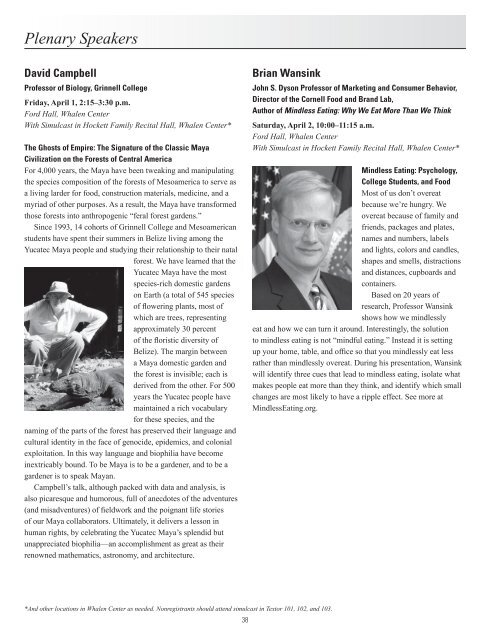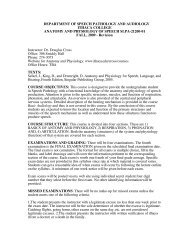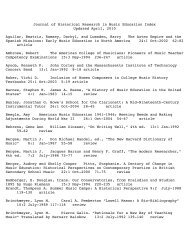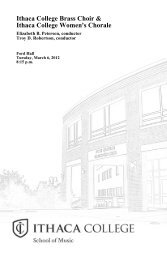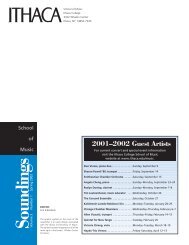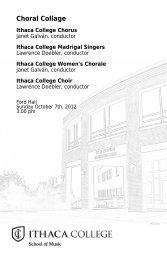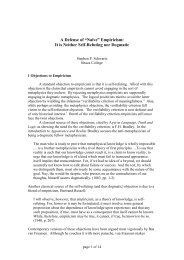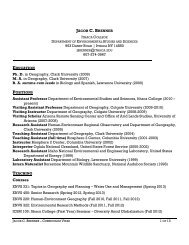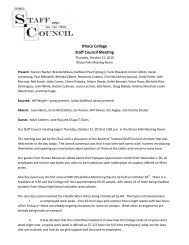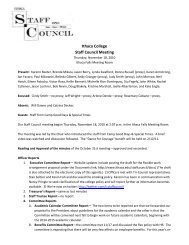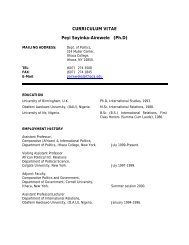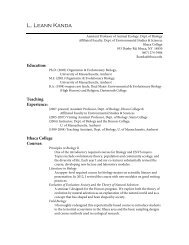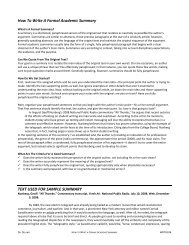ncur 2011 conference program ithaca college 25th national
ncur 2011 conference program ithaca college 25th national
ncur 2011 conference program ithaca college 25th national
Create successful ePaper yourself
Turn your PDF publications into a flip-book with our unique Google optimized e-Paper software.
Plenary Speakers<br />
David Campbell<br />
Professor of Biology, Grinnell College<br />
Friday, April 1, 2:15–3:30 p.m.<br />
Ford Hall, Whalen Center<br />
With Simulcast in Hockett Family Recital Hall, Whalen Center*<br />
The Ghosts of Empire: The Signature of the Classic Maya<br />
Civilization on the Forests of Central America<br />
For 4,000 years, the Maya have been tweaking and manipulating<br />
the species composition of the forests of Mesoamerica to serve as<br />
a living larder for food, construction materials, medicine, and a<br />
myriad of other purposes. As a result, the Maya have transformed<br />
those forests into anthropogenic “feral forest gardens.”<br />
Since 1993, 14 cohorts of Grinnell College and Mesoamerican<br />
students have spent their summers in Belize living among the<br />
Yucatec Maya people and studying their relationship to their natal<br />
forest. We have learned that the<br />
Yucatec Maya have the most<br />
species-rich domestic gardens<br />
on Earth (a total of 545 species<br />
of flowering plants, most of<br />
which are trees, representing<br />
approximately 30 percent<br />
of the floristic diversity of<br />
Belize). The margin between<br />
a Maya domestic garden and<br />
the forest is invisible; each is<br />
derived from the other. For 500<br />
years the Yucatec people have<br />
maintained a rich vocabulary<br />
for these species, and the<br />
naming of the parts of the forest has preserved their language and<br />
cultural identity in the face of genocide, epidemics, and colonial<br />
exploitation. In this way language and biophilia have become<br />
inextricably bound. To be Maya is to be a gardener, and to be a<br />
gardener is to speak Mayan.<br />
Campbell’s talk, although packed with data and analysis, is<br />
also picaresque and humorous, full of anecdotes of the adventures<br />
(and misadventures) of fieldwork and the poignant life stories<br />
of our Maya collaborators. Ultimately, it delivers a lesson in<br />
human rights, by celebrating the Yucatec Maya’s splendid but<br />
unappreciated biophilia—an accomplishment as great as their<br />
renowned mathematics, astronomy, and architecture.<br />
Brian Wansink<br />
John S. Dyson Professor of Marketing and Consumer Behavior,<br />
Director of the Cornell Food and Brand Lab,<br />
Author of Mindless Eating: Why We Eat More Than We Think<br />
Saturday, April 2, 10:00–11:15 a.m.<br />
Ford Hall, Whalen Center<br />
With Simulcast in Hockett Family Recital Hall, Whalen Center*<br />
Mindless Eating: Psychology,<br />
College Students, and Food<br />
Most of us don’t overeat<br />
because we’re hungry. We<br />
overeat because of family and<br />
friends, packages and plates,<br />
names and numbers, labels<br />
and lights, colors and candles,<br />
shapes and smells, distractions<br />
and distances, cupboards and<br />
containers.<br />
Based on 20 years of<br />
research, Professor Wansink<br />
shows how we mindlessly<br />
eat and how we can turn it around. Interestingly, the solution<br />
to mindless eating is not “mindful eating.” Instead it is setting<br />
up your home, table, and office so that you mindlessly eat less<br />
rather than mindlessly overeat. During his presentation, Wansink<br />
will identify three cues that lead to mindless eating, isolate what<br />
makes people eat more than they think, and identify which small<br />
changes are most likely to have a ripple effect. See more at<br />
MindlessEating.org.<br />
*And other locations in Whalen Center as needed. Nonregistrants should attend simulcast in Textor 101, 102, and 103.<br />
38


